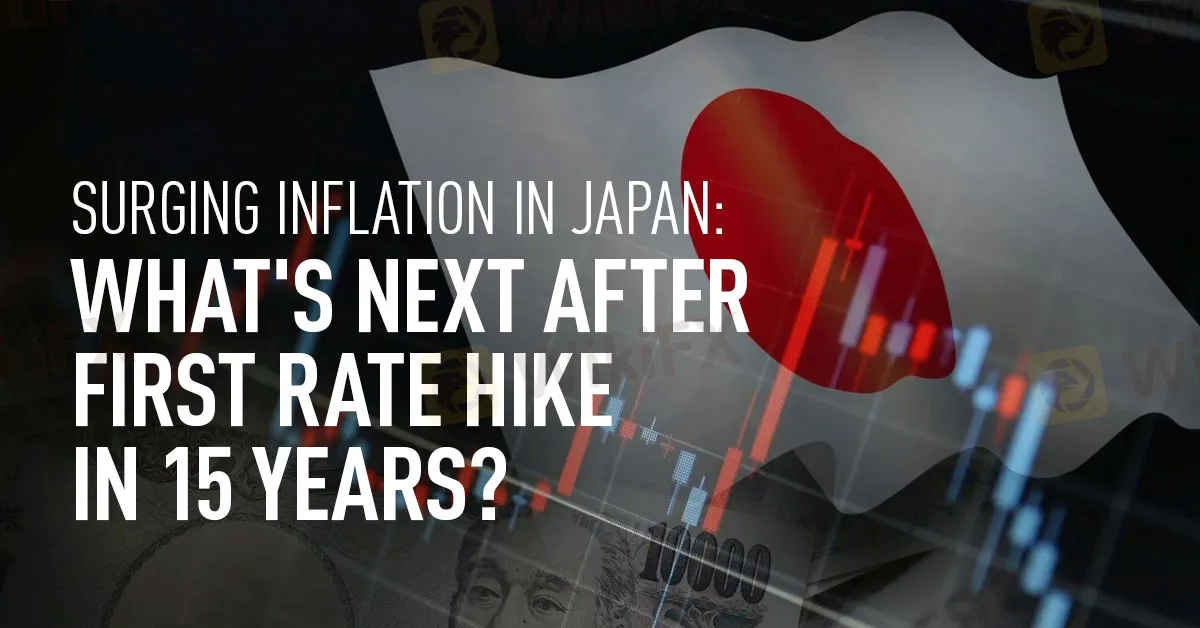简体中文
繁體中文
English
Pусский
日本語
ภาษาไทย
Tiếng Việt
Bahasa Indonesia
Español
हिन्दी
Filippiiniläinen
Français
Deutsch
Português
Türkçe
한국어
العربية
Surging Inflation in Japan: What's Next After First Rate Hike in 15 Years?
Abstract:Consumer inflation in Japan accelerated to its fastest pace in four months, prompting market attention to whether the Bank of Japan might pursue additional interest rate hikes following its first hike since 2007.

Consumer inflation in Japan accelerated to its fastest pace in four months, prompting market attention to whether the Bank of Japan might pursue additional interest rate hikes following its first hike since 2007.
According to the Ministry of Internal Affairs, consumer prices excluding fresh food increased by 2.8% in February compared to a year ago, up from 2% in January, aligning with analysts' forecasts. Similar to previous data for the Tokyo area, much of this growth was attributed to base effects after utility subsidies weighed on prices in 2023.

Following the BOJ's decision to end the negative interest rate, Governor Kazuo Ueda highlighted his close monitoring of service prices, indicating their significance for underlying inflation trends. This observation suggests that changes in service prices, typically occurring at the start of the fiscal year, will be crucial in assessing April's price index.
Ueda explained that the decision to end the negative interest rate was made due to concerns that delaying the move might significantly boost inflationary pressures, potentially necessitating a rapid succession of rate increases. However, he reassured that financial conditions would remain accommodative for the time being, although he acknowledged the possibility of further hikes if inflation risks intensified.
Despite Ueda's remarks, the yen weakened, and Japanese government bond yields fell. Nevertheless, he emphasized the BOJ's readiness to act if upward price risks grew stronger.
Inflation in Japan has proven to be more persistent than initially anticipated, leading the central bank to periodically revise its price growth projections.
Regarding currency intervention, Japanese Finance Minister Shunichi Suzuki stated that it is challenging to speculate on such action when asked about the potential measures to counteract the yen's weakness. This statement came amid expectations of further rate hikes by the Bank of Japan and verbal interventions from Japanese government officials, which provided some support to the yen against the dollar.

Disclaimer:
The views in this article only represent the author's personal views, and do not constitute investment advice on this platform. This platform does not guarantee the accuracy, completeness and timeliness of the information in the article, and will not be liable for any loss caused by the use of or reliance on the information in the article.
Read more

WikiFX Announcement: Suspension of Weekly Simulated Trading Competition
Since its launch in early 2023, the WikiFX Weekly Simulated Trading Competition has successfully hosted 99 consecutive rounds, attracting enthusiastic participation from traders worldwide and creating countless thrilling trading moments.

What Can Forex Traders Learn from Ne Zha?
The animated blockbuster Ne Zha: Birth of the Demon Child tells the story of Ne Zha’s journey to defy fate and take control of his own destiny. Beyond being an inspiring tale filled with action and character growth, the film conveys profound life lessons - many of which resonate deeply with the world of forex trading.

Retirement Savings Wiped Out: RM500,000 Lost to a Scammer named Richard Ong
A retiree was deceived into parting with more than RM500,000 after falling victim to an elaborate investment scam that promised substantial returns.

The Dark Side of Social Media Investments: How a Manager Lost RM2.08 Million
A Malaysian company manager suffered financial losses amounting to RM2.08 million after becoming the victim of an investment scam promoted through Facebook.
WikiFX Broker
Latest News
Forex Market Outlook: Key Currency Pairs and Trading Strategies for March 24–28, 2025
Singapore Police Crack Down on Scams: $1.9M Seized, 25 Arrested
Gold Prices Swing Near Record Highs
XTB Opens New Dubai Office
The Growing Threat of Fake Emails and Phishing Scams
Africa Cybercrime Bust: Over 300 Arrested in Fraud Crackdown
Hong Kong Banks and Authorities Collaborate to Freeze Fraudulent Accounts Faster
SocialFi and the Forex Market: A New Era for Decentralized Social Trading?
Is Billion Bucks Fx Scam?
BaFin Halts USDe Token Issuance, Citing Serious Compliance Failures
Currency Calculator







